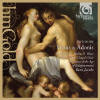Texte paru dans: / Appeared in: |
|
|
Outil de traduction |
|
|
|
|
|
Reviewer: Brian
Robins
John Blow's little masterpiece of concision, which he termed a "Masque for the Entertainment of the King," has long held a special place in my affections. Despite Blow's description, it is of course not a masque but a full-fledged opera with a prolog and three acts that are sung throughout, in addition to including dances. And thereby lies the problem, for Venus and Adonis had the misfortune to be composed at almost exactly the same time as another opera cast in nearly identical mold, and ever since heralded as the (and only) great English Baroque opera—Dido and Aeneas. In fact, Blow's work, first given at the court of Charles I between 1681 and 1683, almost certainly predates Dido, and almost equally certainly exerted no small influence on Purcell. Furthermore, at the risk of enraging Purcellians (of whom I count myself one), the presumed and accepted superiority of Dido seems to me to be open to question. In at least one respect Venus strikes me as distinctly superior. Although based on a story from Ovid's Metamorphosis, the plot has a universal theme that is more dramatically convincing than that of Purcell's work, where it is difficult to reconcile the proud queen's love for Aeneas and her ultimate suicide with the actions of such a spineless "hero." The tragedy of Venus and Adonis, on the other hand, a story of the loss through accidental death of a loved one, has powerful and timeless resonance. Venus may have no great tragic air to sing on the occasion of the death of Adonis, but her final words are as poignant as anything in opera, and the great, final lamenting chorus, "Mourn for thy servant," is surely fully the equal of "With drooping wings," its counterpart in Dido. There is a further historical point to be made about supposed influence (raised in the notes and repeated in at least two reviews of the present issue) on Venus and Adonis of Lullian tragédie lyrique, in particular Charpentier's Actéon. While Blow's opera may pay a certain homage to the French taste of Charles II (obvious in the French-style overture and dances), its expressive power leans far more toward Italian models, while the supposed influence of Actéon is founded on nothing more than the hunting link between the two operas and is entirely specious, recent research dating Charpentier's work from 1684, later than any date suggested for Venus. Venus and Adonis has been lucky on disc in the CD era, this being the fourth version, all of which have very positive merits. First in the field was the earlier Harmonia Mundi version, with Lynne Dawson a radiant Venus. Following hard on its heels came a DHM recording with Anthony Rooley's Consort of Musick forces, of particular value on its initial appearance, since the two-ČD set also included the only recorded version of Matthew Locke's fine masque, Cupid and Death. That recording also probably remains the closest in scale to the original court performance, its chamber proportions further distinguished by the touching and beautifully sung Venus of Emma Kirkby. Some four or five years later Philip Pickett's recording featured yet another highly successful Venus in Catherine Bott, perhaps the most sensuously sung of all recorded assumptions of the role. Jacobs's choice of Rosemary Joshua represents something of a departure, for hers is not a natural early-music voice. Bigger, rounder, and more voluptuous, hers is what one might term a Rubens Venus (quickly adding that the analogy is to the voice, not an illusion to the lady's figure). That also brings the disadvantage of rather more vibrato at times than one might like, but it is a minor price to pay for an expressive power that never steps beyond the bounds of style. Lovingly persuasive in her act I exchanges with Adonis, delightfully playful in the act II lesson of the Little Cupids, almost unbearably grief-stricken at the climax of the opera, Joshua is an utterly convincing proponent of the role in all its facets. She is fortunate in her Adonis, for Gerald Finlay's is unquestionably the best I've heard, a manly, virile-sounding hero whose youthful death is therefore the more moving. The other parts are cast in strength, Jacobs's choice of a male alto for Cupid vindicated by the characterful and excellently sung performance of Robin Blaze, while to have an artist of the stature of Maria Cristina Kiehr in the small role of the Shepherdess is luxury casting indeed. The whole production is in fact marked by the same vivid theatrical projection and care for diction that Jacobs brought to his revelatory Così fan tutte. Right from the richly detailed account of the overture he draws superlative playing from the OAE, giving full value to Blow's bold harmonies, and a dynamic rhythmic buoyancy to the dances. While for the reasons cited above I would not dispense with the Rooley or Pickett versions, there can be little doubt that anyone coming new to the work Jacobs, who is also given superb sound, now represents a clear first choice for Venus and Adonis, a precious gem that eloquently proves that, like Dido and Aeneas, not all great operas take three hours to make their point. | |
|
|
|
|
|
|
|
Cliquez l'un ou l'autre
bouton pour découvrir bien d'autres critiques de CD |
|




